

Circle.so is renowned for its community-building features, making it a popular choice among educational creators, coaches, course creators, and digital entrepreneurs. However, it might not be the perfect fit for everyone.
Several common reasons might prompt users to seek alternatives to Circle.so:
The #1 to make money online with TikTok Search (FREE TRAINING)

Aligning platform capabilities with your business growth and requirements is vital. As your business evolves, your platform needs to scale with you, providing the necessary support and customization options to meet changing demands. Exploring alternatives will ensure you have the best possible toolset to achieve your goals, whether you’re looking to build an engaged community, sell courses, or manage memberships.
Once you’ve chosen your community platform, don’t forget to check out our article on finding that perfect community name.

Teach is a modern community platform designed to empower both you and your community, letting you host events, create courses, and engage your audience. It offers gamification strategies to enhance engagement, a built-in calendar for event management, a chat feature to connect with community members, and sales pages to help you increase revenue.
Teach’s user-friendly interface makes it easy to create a unique community experience. The platform’s design prioritizes engagement, ensuring that users can easily collaborate with each other and with the content. Whether you’re starting a group coaching business or just selling courses, do it all with ease.
Teach is a better platform if you want access to everything in one place – no integration necessary. Teach’s extensive feature set and powerful engagement tools make it an excellent alternative for those looking to build a unique and engaging community experience.
Start your 14-day free trial with Teach.io today.
Thinkific specializes in course creation, offering a range of tools to design, market, and sell online courses. It supports community features through discussion forums and integrates with various marketing and analytics tools. Thinkific’s course creation tools are robust and versatile, allowing users to create engaging and interactive learning experiences.
Thinkific’s platform is intuitive, with a drag-and-drop course builder that simplifies the creation process. It’s designed to be accessible for users with varying levels of technical expertise, ensuring that anyone can create and manage high-quality online courses. Thinkific’s interface is clean and straightforward, making it easy to navigate and use.
While Circle.so offers broader community management features, Thinkific excels in course creation and delivery. It’s a better choice for those whose primary focus is on developing and selling educational content. Thinkific’s robust course creation tools and intuitive design make it an excellent alternative for educators and course creators.
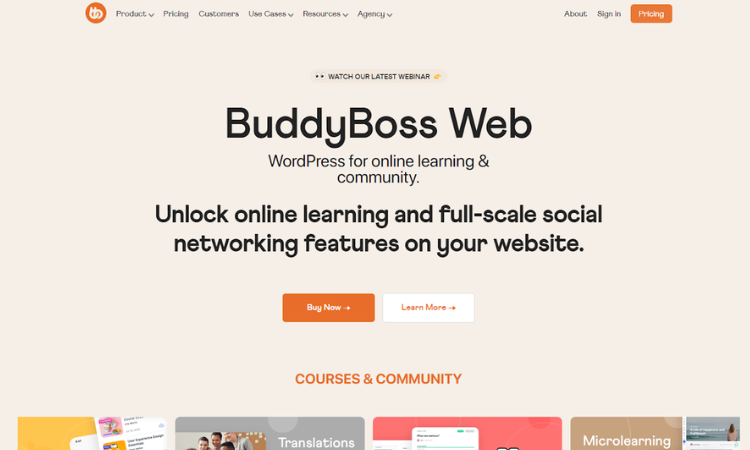
BuddyBoss is a comprehensive platform designed to build online communities and membership sites. It offers a wide range of features, including social networking, online courses, and gamification. BuddyBoss integrates seamlessly with WordPress, making it a powerful tool for those already using the WordPress ecosystem.
BuddyBoss’s user-friendly interface and extensive feature set make it easy to create and manage a vibrant online community. The platform’s integration with WordPress ensures that users can leverage the full power of the WordPress ecosystem. BuddyBoss’s design prioritizes user engagement, ensuring that members can easily interact with each other and with the content.
BuddyBoss offers more advanced social networking and membership site features compared to Circle.so. It’s a better choice for those already using WordPress and looking for a powerful, integrated solution. BuddyBoss’s comprehensive feature set and seamless WordPress integration make it an excellent alternative for WordPress users.

Patreon is a well-known platform that enables creators to build and monetize their communities through memberships. It offers a range of features, including tiered memberships, content sharing, and community engagement tools. Patreon’s focus on monetization makes it a powerful tool for creators looking to generate revenue from their content.
Patreon’s user-friendly interface and robust monetization tools make it easy to create and manage a membership-based community. The platform’s design prioritizes user engagement and revenue generation, ensuring that creators can effectively monetize their content. Patreon’s extensive feature set and intuitive design make it a popular choice among creators.
Patreon offers more advanced monetization features compared to Circle.so. It’s a better choice for creators looking to generate revenue from their content. Patreon’s focus on memberships and revenue generation makes it an excellent alternative for those prioritizing monetization.
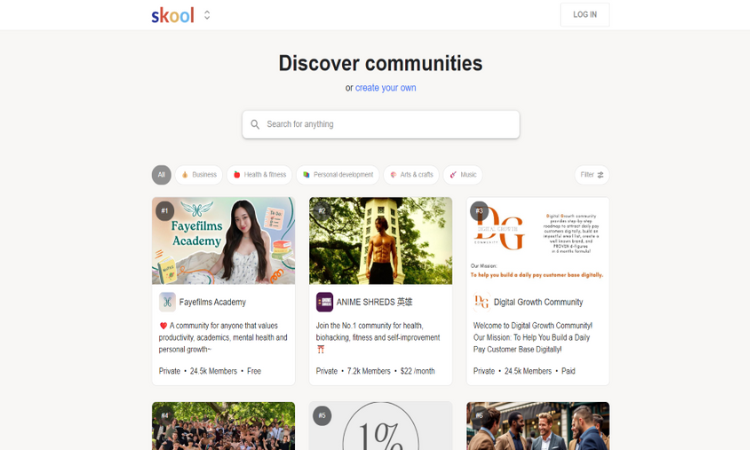
Skool combines community, courses, and gamification in one platform. It offers features for creating and selling courses, engaging community members, and gamifying the learning experience. Skool’s integration with various tools and platforms enhances its functionality and flexibility.
Skool’s user-friendly interface and comprehensive feature set make it easy to create and manage a vibrant online community. The platform’s design prioritizes engagement and learning, ensuring that users can effectively interact with each other and the content. Skool’s integration with various tools and platforms makes it a powerful and flexible solution.
Skool offers more advanced course creation and gamification features compared to Circle.so. It’s a better choice for educators and course creators looking
The #1 to make money online with TikTok Search (FREE TRAINING)

For those who are budget-conscious, several free platforms offer similar features to Circle.so without the financial commitment
Discord, originally designed for gamers, has evolved into a versatile communication platform. It offers voice, video, and text chat capabilities, along with a robust system of channels and servers that you can customize to suit different community needs. Discord also supports bots, which can automate tasks and enhance user interaction.
While Discord is feature-rich, there are limitations on integrations and customization options. Additionally, managing larger communities can become cumbersome due to the platform’s structure, which is primarily designed for real-time communication rather than comprehensive community management. There are also no options for branding.
Using Discord means dealing with limited customization options and the presence of Discord’s branding. While it offers robust communication tools, it may lack some of the community-building and management features found in paid platforms like Circle.
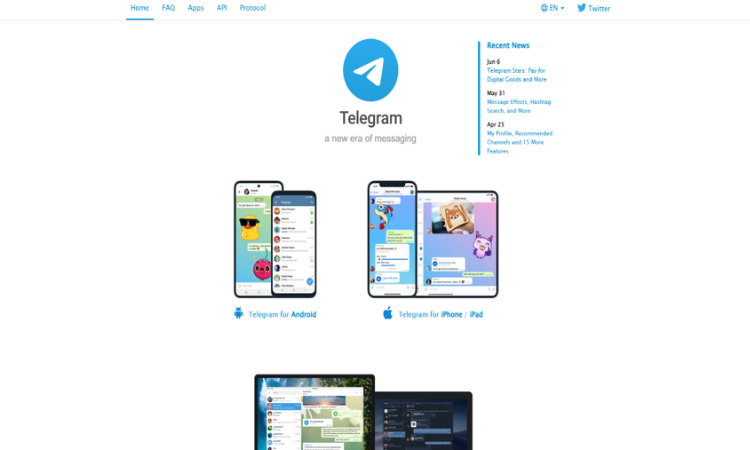
Telegram is known for its strong security features and the ability to host large groups with up to 200,000 members. It supports multimedia sharing, bots for automation, and channels for broadcasting messages to large audiences. Telegram’s focus on security and privacy makes it a reliable choice for sensitive communications.
The customization and community management features are limited compared to specialized community platforms. Telegram’s focus is more on communication rather than detailed community building. The platform also lacks advanced analytics and monetization tools that some users might require.
While Telegram offers excellent security and communication features, it lacks advanced community management tools and customization options. Users may need to supplement Telegram with other tools to achieve comprehensive community management.
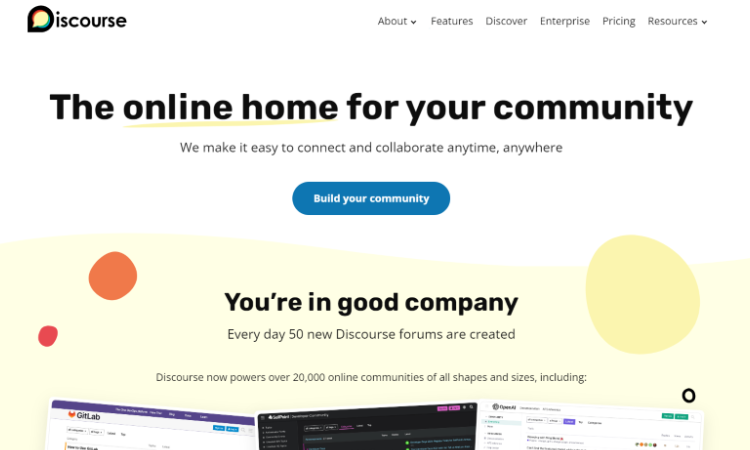
Discourse is an open-source platform designed to create community forums. It offers robust moderation tools, customizable themes, and integration with various plugins to enhance functionality. Discourse’s flexibility and customization options make it a powerful tool for building unique and engaging community forums.
Discourse is user-friendly and highly customizable, making it suitable for creating unique community experiences. Its open-source nature allows for extensive customization to meet specific needs, ensuring that users can create the exact forum experience they desire. Discourse’s interface is clean and intuitive, making it easy to use and navigate.
Discourse provides a customizable and flexible forum solution compared to Circle.so. However, it may be more difficult to set up courses and monetize your audience that way.
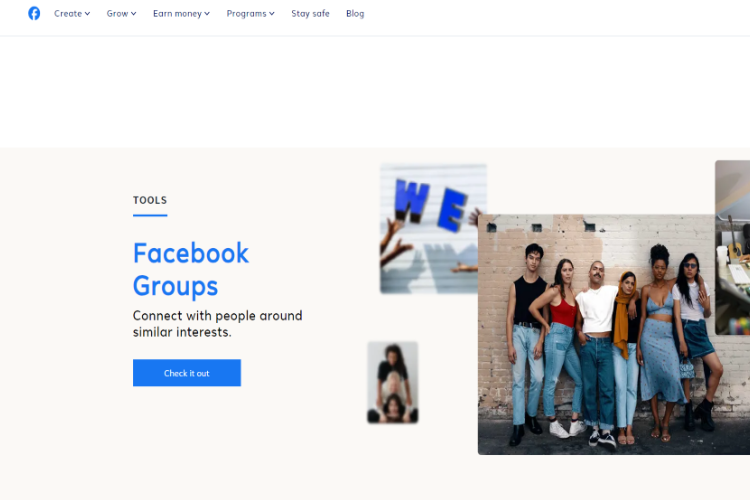
Facebook Groups is a popular choice for building online communities, leveraging Facebook’s vast user base. It offers various features like media sharing, events, polls, and administrative tools to manage group membership and engagement. The integration with Facebook’s broader ecosystem can help boost visibility and engagement.
The primary limitation is the lack of control over data and the presence of Facebook’s branding and ads. Customization options are minimal, and users must navigate the broader Facebook ecosystem, which can be distracting. Additionally, privacy concerns have been raised about using Facebook for sensitive community interactions.
Using Facebook Groups means dealing with Facebook’s branding, ads, and potential privacy issues. While it’s a free and accessible option, it lacks the advanced customization and management tools available in dedicated community platforms.
Choosing the right platform to build and manage your online community is essential for your business’s growth and success. Whether you’re looking for a free solution to get started or a comprehensive paid platform with advanced features, there are numerous Circle.so alternatives to consider. Each platform offers unique features and benefits, making it important to evaluate your specific needs and goals before making a decision.
One example is Teach.io. Discover how Teach.io can help you build, engage, and monetize your online community effectively. Start your 14-day free trial with Teach.io today.
By carefully considering your specific needs and goals, you can choose the platform that best supports your community-building efforts and business growth. Whether you prioritize ease of use, advanced features, or comprehensive integration options, there’s a Circle.so alternative that’s perfect for you. Start exploring today and find the platform that will help you achieve your goals and build a thriving online community.





